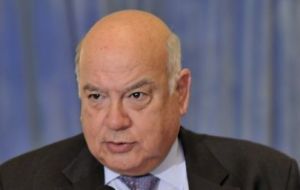MercoPress. South Atlantic News Agency
OAS General Assembly will hold major debate on the drug problem in the Americas
 Insulza: the decriminalization of drug use will be on the table, based on the legislation and resources of each county
Insulza: the decriminalization of drug use will be on the table, based on the legislation and resources of each county Secretary General José Miguel Insulza presented on Monday the Report on the Drug Problem in the Americas to the members of the OAS Permanent Council, in a special meeting of the Inter-American Drug Abuse Control Commission (CICAD) in which he expressed his hope that the document is understood “not as a conclusion, but only as the beginning of a long awaited debate.”
The Report which among other issues considers the decriminalization of drug use and suggests ‘four conclusions’ will be at the centre of discussions at the next OAS General Assembly to be held from June 4 to 6, 2013 in Antigua, Guatemala. The central theme of the meeting of the highest political body of the OAS, chosen by the host country, will be “Toward a Comprehensive Anti-Drug Policy in the Americas”.
Secretary General Insulza, upon presenting the report, said the document should not be seen to “cast doubts or raise questions about the progress that has been made so far in terms of collective action in our hemisphere on drugs, but rather should be understood to be based upon the identification of what serves the needs of each and that which serves the needs of all.”
“We believe we have opened a door to strengthening hemispheric action on an issue that affects all of our peoples alike, and requires, therefore, our collective commitment and solidarity”.
Insulza said that, by entrusting the Report to the OAS, “the Heads of State of our hemisphere assigned us a great responsibility. At the same time, they prescribed very precise limits for our response to it. That is why the Report I am presenting today lays out facts that will assist in decision-making, but does not propose solutions. That is up to our leaders, who will have a firm basis for their deliberations in future debates”.
”Nevertheless,“ said the Secretary General, ”it is part of our duty and responsibility to contribute to those deliberations.“
Therefore four conclusions were presented ”that emanate directly from the analysis“ in the Report: the drug problem must be dealt with taking into account each country’s different situation; countries with fewer resources and less institutional strength have more difficulty dealing with the impact of drug trafficking; the phenomenon requires a public health approach; and the approach to the problem must be multifaceted, flexible, must take into account differences, and the countries of the regions must be united in their diversity.
Insulza emphasized that, regarding the decriminalization of drug use and the possibility of changes in national legislation that ”it is clearly contradictory to say you want to treat drugs addict as people with an illness and at the same time, penalize them for their consumption.” He then clarified that “this does not mean that the patient does not need to be treated to remove them from their addiction and this could mean - if the addict threatens their own life or the security of others - a stay in a health facility. But we do not consider that sending serious addicts to prison is an appropriate treatment and, indeed, we think it can aggravate their condition even beyond the point of no return.”
With regard to criminal violence “we focus in the Report on the consideration of the possible reasons why this violence is present with greater intensity and virulence in some countries and not in others.”
“Our conclusion” said Insulza “is that it is very likely that this difference is due mainly to two reasons: the economic and social development and especially the well differentiated capabilities of States to ensure the protection of their citizens and, mainly, to ensure that laws are complied with.” In terms of economic status, Insulza called attention to the fact that many of those who are recruited to participate in the drug trade ”come from dispossessed social sectors.“ He said that this fact leads the Report to note that ”social development and the elimination of social exclusion, particularly in producer and transit countries, lie at the core of overcoming the drug problem”.
The Report, which was delivered last Friday, May 17, 2013, to the President of Colombia, Juan Manuel Santos, consists of two parts: the Analytical Report, explaining the reasons that have caused concern in society about drug consumption and which have led to attempts to control the effects of drugs on human health; and the Scenarios Report, an examination of the paths that the phenomenon could take in the hemisphere in the coming years.




Top Comments
Disclaimer & comment rules-

-

-

Read all commentsI can just see Argentina trying to get a Malvinas mention right at the end, just as everyone else has finished applauding and pushing back their chairs trying to leave.
May 21st, 2013 - 10:03 am 0but... in Argentina they re-trained the sniffer dogs to seek dollars instead ! who's going to sniff out the drugs “ Maradona” ! ..
May 21st, 2013 - 04:18 pm 0will hold major debate on the drug problem ==
May 21st, 2013 - 06:18 pm 0aparently CFK is top of the list lol.
Commenting for this story is now closed.
If you have a Facebook account, become a fan and comment on our Facebook Page!